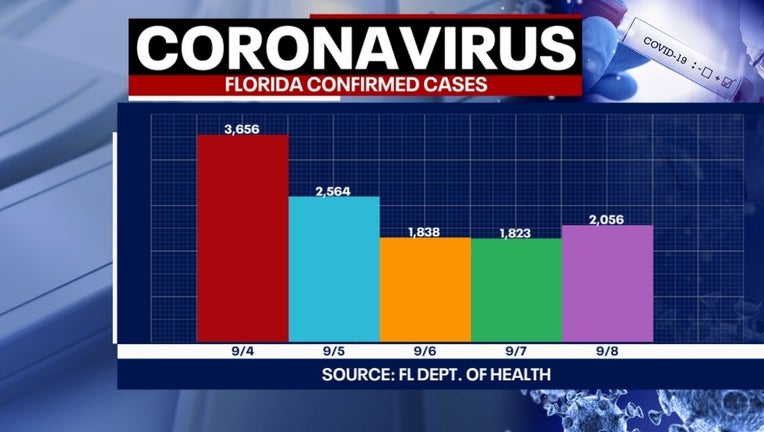Florida health officials report 200 more COVID-19 deaths, over 2,000 new cases

ORLANDO, Fla. - The Florida Department of Health reported 2,056 new cases and 200 more deaths on Wednesday.
That brings the statewide total of COVID-19 cases since the start of the pandemic to 652,148, resulting in 12,115 deaths.
The increase in deaths is the highest mark in about three weeks but one that likely reflects fatalities that occurred over several days. It likely reflects a lag in reporting caused by the three-day holiday weekend. The number of deaths reported usually drop over the weekend, before going higher as the week progresses as the lag is eliminated.
The number of people being treated for COVID-19 in hospitals also has been on a downward trend, since late July highs of more than 9,500. There were 3,081 patients in the late morning Wednesday, according to a hospital bed census posted online by the state.
RELATED: Interactive map of COVID-19 cases across Florida
If you are having trouble seeing the map or using it (especially on a mobile device), click here to load in a new window.
Phase two of Florida's reopening is ongoing. The following is in effect:
- The 'Safe. Smart. Step-by-Step. Plan for Florida's Recovery' plan allows for restaurants to operate with 50 percent indoor seating capacity and full capacity outdoors with appropriate social distancing. Restaurants can also allow for bar-top seating.
- Bars, pubs, and taverns were originally allowed to operate with similar guidelines but have since been ordered to shut down, as the state has put a temporary ban on liquor sales at bars because of a rise in cases over the summer. Leaders in the industry are working to come to an agreement with the state on reopening.
- Retail stores can currently operate at full capacity with appropriate social distancing and sanitization protocols. Many chains have included social distancing signage, sanitizing stations, and limited hours in their new safety measures.
- Amusement parks have reopened in Florida as well, all with limited capacity and enhanced safety measures to protect both park guests and employees.
- Gyms can operate at full capacity with appropriate social distancing and sanitization.
- Movie theaters, concert houses, auditoriums, playhouses, bowling alleys, and arcades can operate at 50 percent capacity with appropriate social distancing and sanitization protocols, according to the 'Safe. Smart. Step-by-Step. Plan for Florida's Recovery' plan.
- Barbershops, hair salons, and nail salons may operate with appropriate safety protocols.
- Governor DeSantis is allowing some visitors at Florida nursing homes and long-term care facilities. General visitation is allowed as long the residence has gone 14 days without any new cases of COVID-19 among residents and staff. Then, visitors will be required to socially distance from the residents. Facilities are allowed to ask guests to take a COVID-19 test.
- The 'Safe. Smart. Step-by-Step. Plan for Florida's Recovery' plan also allows for professional sports venues to open and continue operating for games, events, competitions, and training.
- Both museums and libraries can operate at full capacity, the 'Safe. Smart. Step-by-Step. Plan for Florida's Recovery' plan states.
- Elective surgeries can be conducted at hospitals with adequate personal protective equipment (PPE) and safety protocols, the plan states.

Coronavirus latest with Dr. Oz
Dr. Oz talks to Good Day Orlando about the latest on the coronavirus.
Coronavirus can spread from person to person through small droplets from the nose or mouth, including when an individual coughs or sneezes. These droplets can land on objects and surfaces. Others can then contract the virus by touching these objects or surfaces, then their eyes, nose or mouth.
As stated before, symptoms of the coronavirus include fever, cough and shortness of breath. They may show in as few as two days or as many as 14 days following exposure, the Florida Department of Health says. Most people recover from COVID-19 without special treatment, but the elderly and those with underlying medical problems are more likely to develop serious illness.
If you display coronavirus symptoms, you should contact a local health organization and make them aware of your condition prior to arrival while also following specific instructions or guidelines they may have.

3 UCF sororities quarantined due to positive coronavirus cases
Due to a small number of positive coronavirus cases involving three sororities on the University of Central Florida campus, officials say they have placed residents in those houses on a two-week quarantine.
RELATED: Mitch McConnell proposes 'targeted' coronavirus aid, Democrats say not enough
If you are experiencing a medical emergency, call 911 and let them know if you have been infected or believe that you may be. If you are infected, a medical professional or another authority will likely advise that you remain isolated while sick. This includes staying at home and not going into public places or large events.
Please visit the Department’s dedicated COVID-19 webpage for information and guidance regarding COVID-19 in Florida.
For any other questions related to COVID-19 in Florida, please contact the Department’s dedicated COVID-19 Call Center by calling 1-(866) 779-6121. The Call Center is available 24 hours a day. Inquiries may also be emailed to COVID-19@flhealth.gov.

AstraZeneca COVID-19 vaccine study put on hold after ‘unexplained illness’
Late-stage studies of AstraZeneca’s COVID-19 vaccine candidate are on temporary hold while the company investigates whether a recipient’s “potentially unexplained” illness is a side effect of the shot.
Globally, there have been over 27.6 million COVID-19 cases, resulting in over 898,000 deaths, according to John Hopkins University.
Below is an interactive John Hopkins University dashboard, showing a country-by-country breakdown of positive COVID-19 cases across the world.
MOBILE USERS: Click here to view the interactive John Hopkins University dashboard
CLICK HERE FOR COMPLETE CORONAVIRUS COVERAGE
Tune in to FOX 35 Orlando for the latest coronavirus news.

